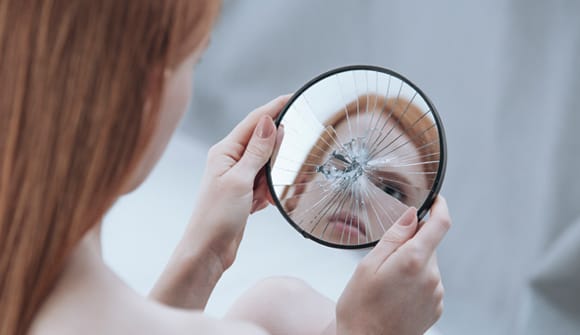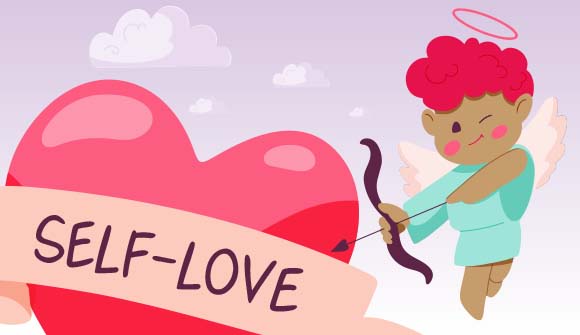Mirror, mirror
The reflection is distorted for people with body dysmorphia.
Article Author: Beth Stambaugh
Article Date:

Lana Condor, star of the hit Netflix movie series, “To All the Boys,” recently revealed her struggle with body dysmorphic disorder (BDD). “I was constantly critiquing myself,” she said in a People magazine article, referring to her recovery as an everyday healing process.
“BDD is a mental health disorder where you obsess about the way you look, constantly evaluating yourself in the mirror and fixating on a perceived flaw that is often minor and isn’t noticed by anyone else,” said Mary Lou Prendergast, LMHC, a licensed mental health counselor with Baptist Behavioral Health.
More than 5 million people in the United States are affected by BDD. Some feel so embarrassed and ashamed, they avoid social situations and become isolated and depressed. The disorder affects women more than men and symptoms typically first appear around age 12.
“People with this disorder fixate on a specific body part or facial feature,” said Prendergast. “In some cases, a person will stare into the mirror repeatedly to analyze his or her face, perhaps thinking their nose is enormous. Others are preoccupied with the perceived size of their thighs, stomach or other body parts,” she said.
What’s normal?
We’ve all experienced times when we don’t like what we see in the mirror. So how can you tell the difference between BDD and a bad day?
“Body dysmorphia is an obsessive-compulsive disorder, where you have repeated unwanted thoughts about the same thing over and over again,” Prendergast said. “The disorder can become unmanageable and start to control your life.”
A person may have BDD if he or she:
- Thinks others view his or her physical appearance negatively
- Believes other people make fun of a perceived flaw
- Tries to fix or hide a perceived flaw
- Checks the mirror, grooms, or picks skin frequently
- Compares his or her looks to others
- Seeks constant reassurance about appearance
- Has perfectionist tendencies
- Has had cosmetic procedures with little satisfaction
Pandemic problem
Since the COVID-19 pandemic began, Prendergast has noticed a big increase in the number of patients she sees with body dysmorphia.
“Isolation is the perfect breeding ground for BDD. We’re all at home more and there’s more time to notice and study yourself,” she said.
Pressure to project a certain image on social media can lead to body perception issues, especially due to the use of apps that can alter the size or shape of your features.
Treatment through therapy
If left untreated, BDD can become serious. Eating disorders, like anorexia and bulimia, often go hand in hand with BDD, and many people become so obsessed with their appearance it takes over their lives.
Cognitive behavioral therapy is usually effective in treating obsessive-compulsive disorders like BDD. This type of therapy helps change thinking and behavior patterns.
“It retrains your brain so you start to recognize negative thoughts and stop allowing them take hold,” said Prendergast. “You have to start challenging your thinking to break the cycle of negative self-talk.”
Prendergast tells her patients to imagine a gate. “When a negative thought enters your mind, you can choose to open the gate and let it in or keep the gate shut.”
She knows patients are making progress when they no longer focus solely on body image during a session.
“That negative voice becomes less prevalent,” Prendergast explained.
How can parents help?
Because body dysmorphia usually develops around age 12, parents can play a positive role if they notice signs early on.
“My best advice is not to be punitive when speaking to your child. It’s easy to get frustrated and want to tell your child to stop looking in the mirror and stop obsessing, but these words aren’t helpful and can make the condition worse,” she said.
Instead, keep the lines of communication open and express concern, support and love. If your child confides in you, show you take those concerns seriously, and don’t hesitate to get professional help when needed.
Recovery is possible
As with overcoming any obsession or addiction, making progress is the main objective, even if it’s just baby steps.
Of her public struggle with BDD, Netflix actor Condor said, "The healing is going to be a journey. Every day it's talking to yourself like you're your own best friend."
If your child or someone you know is struggling with body or self-esteem issues, contact the experts at Wolfson Children’s Behavioral Health and Baptist Behavioral Health at 904.376.3800. If you believe your child is experiencing or at risk of a mental health crisis, call the Wolfson Children’s 24/7 Kids & Teens Helpline at 904.202.7900 or text LIFE to 741741.



